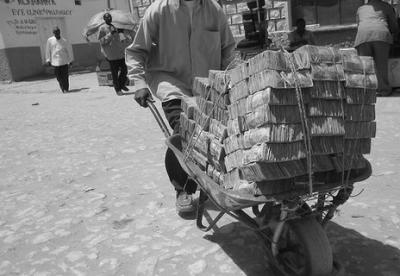Africa has incredible resource wealth, but if it is to reap the benefits, there must be a change of attitude amongst governments, corporations and the international community.
By Caroline Kende-Robb

Now is a good time to be optimistic about Africa. The continent’s global influence is growing after a decade of strong growth, the roots of macro-economic stability and democracy are sinking deeper across the continent, dynamic civil societies are keeping governments on their toes, and government policy is improving. Africa is increasingly being recognised today for its dynamism and creativity.
However, Africa still faces major challenges too. A decade of highly impressive growth has not brought comparable improvements in health, education and nutrition; in many countries, the gap between rich and poor has only widened; and Africa must create jobs fast enough to keep pace with the growth of its young and growing workforce. We have seen elsewhere how frustration and anger over corruption and unresponsive governments can create dangerous social and political environments.
To head off these pressures, the Africa Progress Panel believes that African governments must strengthen health and education systems through more efficient and equitable public spending, with a greater focus on gender disparities. African governments must also remove two major obstacles to development – the lack of infrastructure and energy.
To this end, the wise management of Africa’s incredible natural wealth is a high priority.
Improving transparency and governance
By some estimates, the continent holds as much as 30% of global mineral reserves, and even higher proportions of the world’s gold, platinum, diamonds and manganese. Meanwhile, new exploration continues to reveal much larger reserves than previously known. Africa’s natural resource windfall could change the face of the continent. In Liberia alone, iron ore and petroleum could generate an extra $1.7 billion per year, equal to 148% of the country’s 2011 GDP.
However, Africa and its partners will miss this opportunity to transform the lives of future as well as present generations if they carry on with business as usual. This danger was revealed in stark detail by the Equity in Extractives report released earlier this year by the Africa Progress Panel.
Africa’s natural resource wealth rightly belongs to the continent’s citizens, but these citizens are being robbed of its benefits by revenue diversion, corruption, jobless growth, and rising inequality.
In oil-rich Equatorial Guinea, for example, the economy has grown by an average of 17% a year over the last decade, meaning its GDP per capita is now higher than Poland’s. Yet three-quarters of the population still live in poverty, and child death rates are among the highest in the world.
In our report, the Africa Progress Panel set out to examine how these problems can be resolved by African governments, multinational corporations, and the international community.
As a starting point, African governments should adopt national strategies that set the terms on which their natural resources will be developed and link these strategies to plans for poverty reduction and inclusive growth. These strategies must identify extractive projects that can generate more jobs through linkages with the local economy. Processing natural resources before export can also bring extra value. Africa cannot build dynamic equitable growth while extractive projects operate within enclaves.
Building on the Africa Mining Vision, a blueprint for development formulated by African nations, African governments should also adopt legislation that requires companies bidding for concessions and licenses to disclose fully their beneficial ownership. Tender and concession granting processes must be open and transparent.
Indeed, it is crucial that African governments put transparency and accountability at the heart of their extraction policies. They must manage their citizens’ natural resources efficiently and share the revenues fairly.
Lack of transparency comes at a price – for governments, investors and citizens – as the example of Guinea shows. In 2008, the then government stripped Rio Tinto of half its rights to mine the enormous iron ore deposits at Simandou, and sold them to another company for vastly less than what they were worth. Two years later, the company that got the rights sold 50% of them to the Brazilian company Vale for $2.5 billion at an estimated profit of over 3,000% over two years – equivalent to 2.4 times Guinea’s entire national budget in 2011.
However, the good news is that the trend towards transparency is gaining momentum month by month. Some 14 African countries are now compliant with the Extractive Industries Transparency Initiative, which recently announced more rigorous standards, while governments such as Ghana, Guinea and Liberia are increasingly publishing their oil, gas, and mining contracts online. Changes to the mining code in Guinea could potentially increase the country’s annual mining revenue to $3.15 billion by 2017 from an average of just $123 million.
Corporations behave
Improvements in state governance alone, however, will not ensure success. Multinational companies must also improve their behaviour.
Some foreign investors have shown that it is possible to make a healthy profit while also adhering to the highest international standards of social and environmental protection, but sadly not all choose to do so.
The Africa Progress Panel report analysed five deals, for example, in the Democratic Republic of Congo (DRC). All five deals were characterised by opaque business practices, with the government selling mining rights at rock-bottom prices to middlemen who then resold them for huge profits to bona fide mining companies.
While the middlemen benefited and diverted the proceeds into shell companies in offshore tax havens, these five deals, in which national assets were seriously undervalued, cost the DRC and its citizens $1.4 billion. That’s equivalent to twice the annual health and education budgets combined – a scandal in a country that has some of the world’s worst malnutrition figures, the sixth highest child mortality rate, and over 7 million children out of school.
In contrast, some multinationals continue to impress with their commitment to transparency. Rio Tinto, for example, publishes details about its payments to governments, together with other tax and net earnings details. Since 2007, Norway’s Statoil has also been reporting payments made to governments.
Other multinationals and commodity traders need to join them in doing what is right without waiting for governments to pass laws. Enlightened firms realise that transparent corporate governance builds reputations, reduces political risk, and may ultimately win more extractive contracts too.
Changing global laws
African civil society groups have a critical role to play in keeping politicians and companies honest. They must demand that commercial arrangements between their countries and multinational corporations be fair and mutually beneficial.
But the international community must also step up and make a difference; we must recognise that bad behaviour by government officials and businesses is made possible by our global legal frameworks. Global legal and tax rules allow companies to declare their profits in countries with lower tax rates, denying African governments and peoples of much-needed revenue.
As Kofi Annan, Chair of the Africa Progress Panel, has repeatedly said, tax avoidance may be legal but its extremes have become immoral, unconscionable, and unacceptable. Tax avoidance may once have been seen as an acceptable and standard business practice, but it now costs Africa more than it receives in either international aid or direct foreign investment.
Trade mispricing, a technique to lower tax payments, costs Africa an estimated $38 billion per year, more than the $33 billion in foreign direct investment or $30 billion in official development assistance it receives.
The international community must develop a credible and effective multilateral response. And for this to happen, attitudes will have to change.
Fortunately, there is plenty of evidence that this change has begun. This year’s G8 summit focused on promoting global fairness through trade, transparency, and tax compliance. Both the G8 and G20 summits saw extraordinary developments, paving the way for the automatic exchange of information across tax jurisdictions, for example. G8 and G20 governments have also promised decisive action to clamp down on shell companies.
Meanwhile, more and more governments are developing robust legislation to boost transparency in the extractives sector. Six of the eight G8 countries have said they will join the Extractive Industries Transparency Initiative.
The UK and the European Union are additionally re-examining legislation on money laundering and transparent company ownership. Company registration must be public, easily accessible and open to all, and these registries must also extend to trusts. We must shut down loopholes wherever we can and wherever they are.
The British government’s pressure on its overseas territories and Crown dependencies is encouraging. The US government should likewise investigate how states, such as Delaware, facilitate tax injustice.
A time for action
We have cause to be optimistic – but we should temper this optimism with vigilance and caution.
First, we must ensure that the movement to combat evasion takes into account the real constraints facing Africa. Of course, the rich OECD countries should share information, but African tax authorities may also need financial and technical support to build the necessary capacity so that they too can access this critical information.
Second, we need a critical mass of G8 and G20 countries willing to legislate for full public disclosure of beneficial ownership by companies registered in offshore havens.
Third, we need to turn words into action. One of the world’s largest global service industries – tax consultancy – brings some of the world’s sharpest accountancy minds to bear on the question of how to evade taxation. In response, governments have adopted some excellent principles over the past six months for tackling global tax challenges. Governments and global civil society must now go to the next stage and turn these principles into that elusive goal – achieving tax justice.
This article was based on a speech given by Kofi Annan, former UN Secretary-General and chair of the Africa Progress Panel, at Geneva’s Graduate Institute on 26 September.

